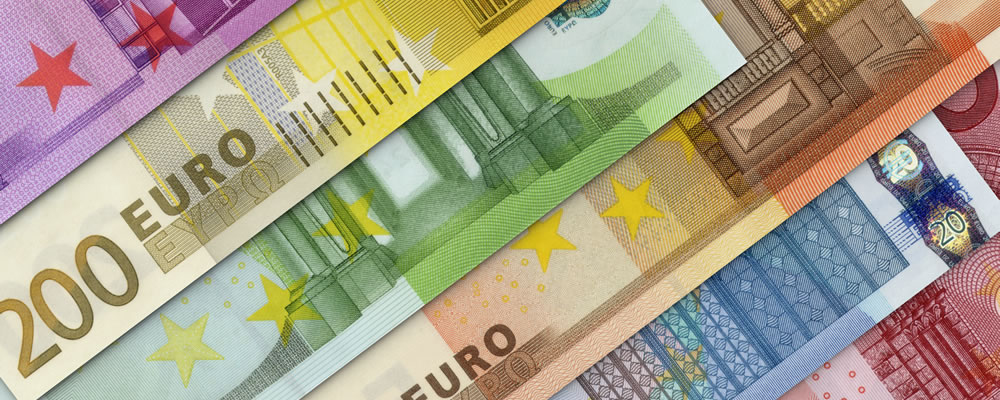While expectations are positive for the latest German Consumer Price Index report Euro exchange rates have struggled to make any gains on Tuesday morning, weighed down by the bullishness of the US Dollar.
- German Import Price Index demonstrated modest improvement – Euro failed to benefit from stronger showing
- Weaker consumer lending and mortgage approvals weighed on Pound – Outlook of UK economy remained mixed as confidence weakened
- Fed rate hike speculation shored up US Dollar once again – Steady inflation boosted odds of 2016 rate hike
- EUR USD exchange rate forecast to rally on higher German inflation – Stronger showing likely to reduce odds of further ECB loosening
Demand for the Pound, meanwhile, weakened in response to some disappointing post-referendum UK data, keeping the EUR GBP exchange rate on a narrow trend.
Euro (EUR) Trended Lower ahead of German Consumer Price Index
Despite the German Import Price Index showing some improvement on the year in July the appeal of the Euro (EUR) remained muted on Tuesday morning. Investors were wary ahead of the European Commission’s ruling on Apple’s potential tax bill, a case which could have significant repercussions for the currency union. Worries persist over the outlook of the Eurozone in the wake of the Brexit vote, with political pressure within the bloc showing little signs of abating. Speculation that the Federal Reserve could raise interest rates before the end of the year has removed further support from the Euro, as such a move would put more pressure on the European Central Bank (ECB).
A strong rally could be in store for EUR exchange rates, however, if the German Consumer Price Index for August proves encouraging. If inflationary pressure within the Eurozone’s powerhouse economy is found to have ticked higher on the year the single currency is likely to strengthen, with the odds of further ECB easing reduced. Stronger German inflation would suggest that the central bank’s monetary loosening measures are having a positive impact, although it remains questionable whether the benefits have extended to other member states. Should inflation across the Eurozone show signs of improvement, though, the Euro is expected to trend higher.
Weaker UK Lending Dented Pound (GBP) Demand as Brexit Worries Persisted
Confidence in the Pound (GBP) weakened in response to the news that consumer lending and mortgage approvals had slowed in July. Lower levels of lending suggest that the UK economy has not fared quite so well in the wake of the referendum, undermining the optimism prompted by other, more positive, data seen in recent days. This could increase the case for the Bank of England (BoE) to consider lowering interest rates again in the near future, something that could see the Euro to Pound (EUR GBP) exchange rate extending its gains further.
Overnight the Pound may find some support on the back of the latest GfK Consumer Confidence Survey, which is forecast to climb from -12 to -8. If consumers are shown to have adopted a more positive outlook on the domestic economy the EUR GBP exchange rate is expected to weaken, despite the fact that the data is a softer indicator of economic health. On the other hand, if confidence failed to recover in August the Pound is likely to experience a renewed sell-off.
Euro to US Dollar Exchange Rate Forecast: USD Strength to Falter on Weaker Consumer Confidence
Although markets initially interpreted Fed Chair Janet Yellen’s Jackson Hole speech as being hawkish in tone the bullish reaction soon faded. While Yellen left the door open for a 2016 interest rate hike she did not offer any particularly strong indications that the Federal Open Market Committee (FOMC) is ready to act imminently. However, while the Dallas Fed Manufacturing Activity Index weakened further than forecast on Monday this was overshadowed by a more robust Personal Consumption Expenditure report. As this is the Fed’s favoured measure of inflation investors were pleased to see a steady result of 1.6%, encouraging renewed bets on a near-term rate hike.
Even so, as researchers at RBS noted:
‘Overall, this report is a mixed bag for the Fed. While the consumer sector is continuing to advance solidly, progress towards the Fed’s 2% inflation mandate has stalled. Data such as this strengthen the case for an increase in the fed funds rate but do not suggest an urgency for policymakers to act in September.’
The Euro to US Dollar (EUR USD) exchange rate is expected to remain generally volatile over coming days, particularly if US data continues to paint a mixed picture of the health of the world’s largest economy. August’s Consumer Confidence survey is predicted to have weakened slightly from 97.3 to 97, a modest decline that could still weigh heavily on the ‘Greenback’ in the absence of further guidance.
Current EUR, GBP, USD Exchange Rates
At the time of writing, the Euro to Pound (EUR GBP) exchange rate was trending narrowly in the region of 0.8538, while the Euro to US Dollar (EUR USD) pairing was slumped around 1.1169.



